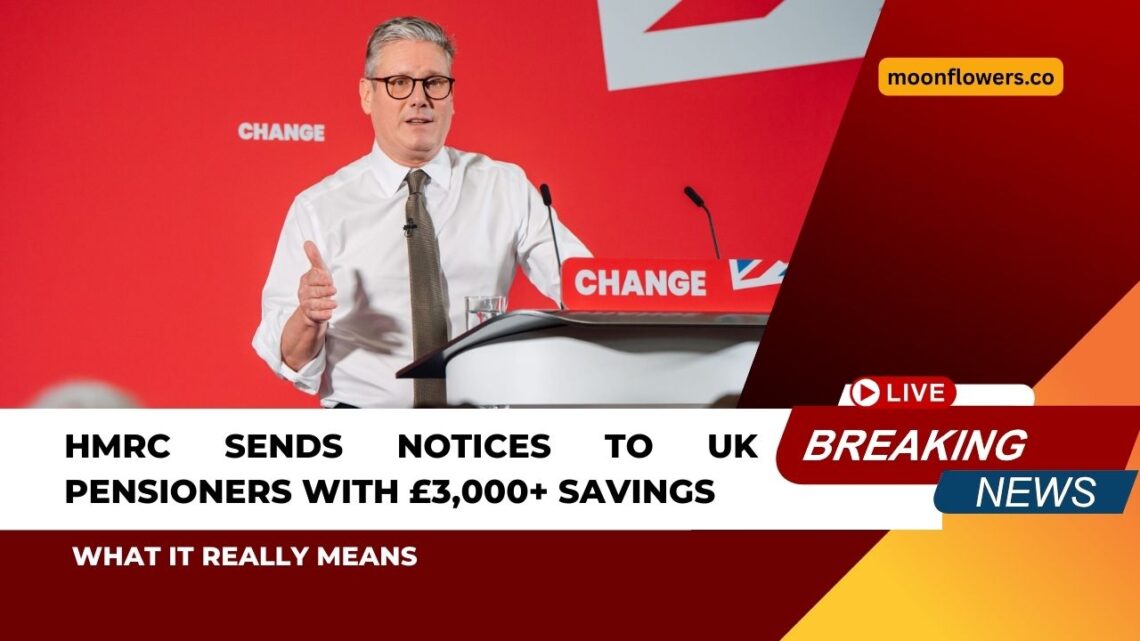In 2025, many UK pensioners have started receiving letters from HM Revenue & Customs (HMRC) regarding their savings, especially when balances exceed £3,000.
These notices are not fines but reminders that even small amounts of savings interest may count as taxable income.
With interest rates higher than in previous years, more retirees are finding themselves affected, making it essential to understand what these notices mean.
Why HMRC Is Targeting Pensioners with Over £3,000 Savings
| Aspect | What It Means |
|---|---|
| Threshold Awareness | While £3,000 is not a tax threshold, it often signals when interest begins to have an impact on tax allowances. |
| Higher Interest Rates | Increased rates in 2025 mean modest savings balances can now generate taxable income. |
| Improved Data Matching | HMRC receives accurate data from banks and building societies, making it easier to track interest. |
| Benefit Accuracy | Savings levels and interest are checked to ensure pensioners are receiving the right benefit amounts. |
What HMRC Notices Actually Mean
- A notice is usually a reminder or calculation, not a penalty.
- It highlights estimated savings interest that may affect tax or benefits.
- If tax is due, HMRC may adjust your tax code so the correct amount is collected automatically.
- Notices also help ensure that means-tested benefits like Pension Credit or Housing Benefit are paid at the right level.
Who Is Most Likely to Receive a Notice
- Pensioners with £3,000–£6,000+ in non-ISA accounts earning higher interest.
- Those receiving state pension plus private pensions, where savings push total income above allowances.
- Pensioners on means-tested benefits whose savings or interest may affect eligibility.
- Individuals whose tax codes or declarations are outdated or incomplete.
Key Rules Pensioners Need to Know
| Allowance / Rule | Details in 2025 |
|---|---|
| Personal Allowance | £12,570 annual income can be earned before tax is due. |
| Personal Savings Allowance (PSA) | Basic-rate taxpayers: up to £1,000 interest tax-free; higher-rate: £500; additional-rate: none. |
| Starting Rate for Savings | Up to £5,000 of interest may be tax-free if other income is low. |
| Pension Credit Savings Disregard | The first £10,000 of savings is ignored; above this, “tariff income” is applied. |
Steps to Take If You Receive a Notice
- Stay calm – these are routine checks.
- Collect documents – savings statements, ISA summaries, and pension records.
- Check the figures – compare HMRC’s calculations with your own bank records.
- Update HMRC if discrepancies exist via your tax account or by contacting them.
- Review benefits eligibility – ensure savings or interest do not impact payments.
- Keep your tax code accurate – this prevents future under- or over-payments.
Common Misconceptions
- £3,000 triggers tax automatically – False. Tax is based on total income and interest, not just savings balance.
- Notices are penalties – False. They are informational, ensuring accurate reporting.
- All savings are taxable – False. ISAs and certain accounts are tax-free, and allowances apply.
In 2025, pensioners are projected to pay billions in tax on savings interest due to rising rates and static allowances.
HMRC is expected to increase monitoring as more retirees hold higher balances in traditional savings. From 2027, additional checks such as providing National Insurance numbers for savings accounts will further tighten compliance.
For pensioners, receiving an HMRC notice about savings is not a penalty but a safeguard. With interest rates higher in 2025, even modest balances can produce taxable income.
Understanding allowances, keeping accurate records, and responding promptly ensures retirees stay compliant, avoid unexpected tax bills, and protect their benefits.
By being proactive, pensioners can enjoy financial peace of mind while managing their retirement savings effectively.
FAQs
Do all pensioners with £3,000 savings get a notice?
No. Notices are issued only if savings interest, combined with other income, pushes pensioners above allowances.
Can ISAs help pensioners avoid these notices?
Yes. Interest from ISAs is always tax-free and does not count towards taxable savings income.
What if I disagree with HMRC’s calculations?
You can check your statements, compare with HMRC’s figures, and update records online or by contacting HMRC directly.
